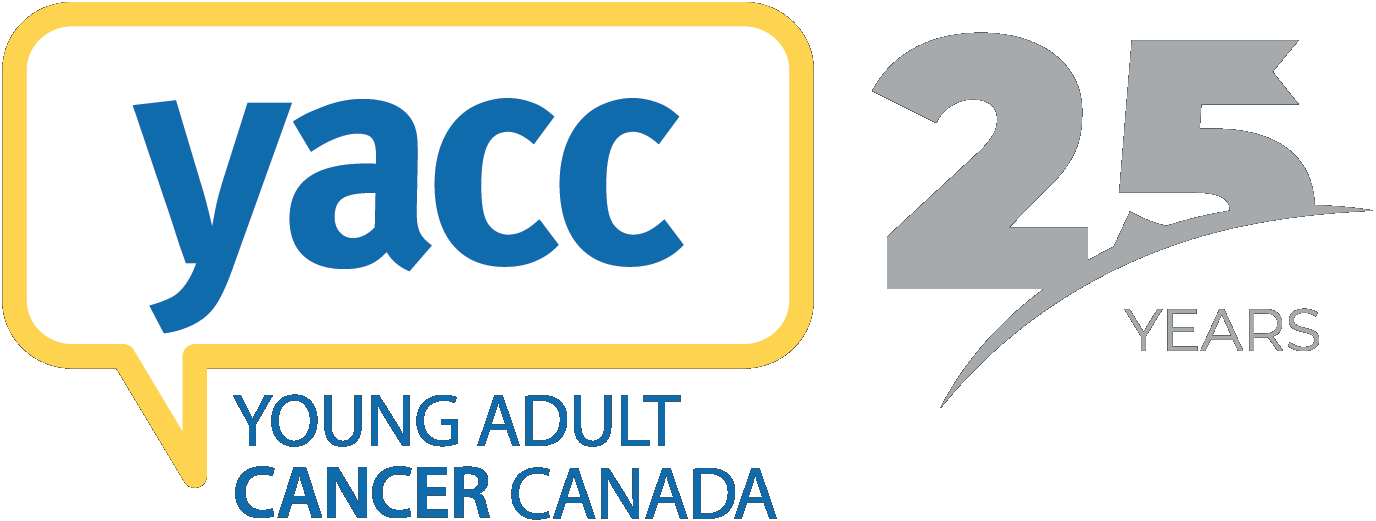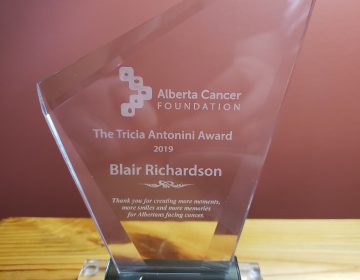By Marley Cameron
Like most people coming out of high school I thought I knew it all. I thought I knew the secrets to being successful. I thought I knew where I would end up in life. I thought I knew what I wanted. Then when I was diagnosed with cancer at 20-years-old, I thought I knew all I needed to know when it came to being sick. I thought that once treatment was done, my life would go back to normal. I thought that my friends would stick by me. I thought I could face this disease head on and if I fought hard enough, I would win — end of story.
It didn’t take me long to realize that I actually knew absolutely nothing about cancer, and I knew even less about what life would be like actually living with cancer long term. In speaking with my peers in the young adult cancer community I found that I was not alone. So many of us were naïve, unprepared, or felt misinformed when it came to our diagnosis/illness. Of course, everyone’s experiences are different — especially when it comes to medical care — but oftentimes learning from the experiences of others who have gone down the same path can provide the most valuable information.
We started to brainstorm ideas on how to best help other young adults who are newly diagnosed with cancer. What do they need to best prepare them on the journey they are about to face? What if we could tell them all of the little secrets that the doctors just simply don’t know? What if there was a cancer “guidebook”?
This brings us here, to this article.
Together with my peers I have compiled a list of all the things I wish I knew. I hope this list can give you guidance where you need it, inspire change in the way you view your care, and most of all, help you to realize that we are all here to support you along the way.
—
“I wish I knew that being brave meant being honest with myself and my family about how I felt. If I were able to share my struggles with a community of people, then I could have understood that being silent was causing emotional trauma and anxiety. I thought that by treating cancer as a cold, and trying to keep living my life, I was being brave, but really I was only hurting myself and my future healing.”
– Kayla T., 26, Grey zone lymphoma
“I wish I was told about and knew of the support groups, and social workers available to me. I had to search and look hard for support. Knowing there were people out there who could help would have been nice off the bat. Instead, I felt helpless.”
– Melissa R., 25, Hodgkin’s lymphoma
“I wish I knew that the road to recovery was going to be long, hard and emotionally and physically draining. I wish I knew what to expect so I could have been better prepared.”
– Laura P., 35, Chondrosarcoma
“I wish I knew of all the good things cancer was going to bring into my life — yes, I said good! Cancer itself is not good; cancer is an ass and it hurt me in many ways. BUT as hard as it was, it changed me and my life in lots of good ways, too. One of the biggest ways being I’ve met and continue to meet the most amazing people through cancer who I otherwise wouldn’t have crossed paths with. I am honoured to call these people my best friends!”
– Naomi-Lee C., 24, Hodgkin’s lymphoma
“I wish I would have known what an emotional roller coaster this journey would be.”
– Justin B., 24, Glioblastoma
“I wish I knew how long it would take for me to feel somewhat ‘normal’ again. I saw what my doctors wrote for an expected return to work date and likely subconsciously thought ‘okay, it’s not long until I can forget about all of this.'”
– Gerard S., 32, Burkitt lymphoma
“I wish I would have known to track my gratitude. I was so focused on the negatives of cancer that I would finish each day thinking it couldn’t get any worse. When I started a gratitude journal, I forced myself to write three things each day that I was grateful for. Some days they were big things (I am grateful to be alive, I am grateful for modern medicine, etc.), and other days they were small (I am grateful to have dressed myself today, I am grateful for snagging the last cranberry juice in the waiting room). Regardless of how big or small each item was, they helped me realize that not every day needs to be bad just because I have cancer. I have grown so much as a person and I have met some of the most amazing people in the world all because of this terrible illness. I just wish I knew that there would be light in this seemingly dark journey.”
– Marley C., 26, Metastatic thyroid cancer
“I wish I knew that my life would be forever changed. I knew that I would change, but I changed as a person and I wasn’t expecting that. I also wish I knew that I would lose friends.”
– Kara P., 42, Breast cancer
“I wish I knew when I was diagnosed that they suspected it was cancer and that they hadn’t just communicated that with my mom who works in cancer care. It bothered me that they undermined me as a patient because I was so young and they didn’t properly communicate the process of the cancer diagnosis. On top of that, I wish a timeline was written down or explained better in detail because I didn’t realize that it would be a month and a half of surgeries and testing before treatment actually occurred. I wish there was more empathy and understanding of where I was in my life stages and resources that spoke to that unique issue.”
– Heather G., Hodgkin’s lymphoma
“I wish I knew that I would have an identity crisis. I suddenly lost all the things that I based my identity on: work, friend group, my research, and my hobbies. It took a long time to feel like me again, and a lot of building my identity through discovering my inner truths. I can be hardworking without a job. I can be curious without a PhD. I can be loving and caring even though my friends had moved on. My identity now is so much more authentic, but it was really, really tough and fully unexpected.”
– Morgan M., 28, Colon cancer
“I wish I knew that there was a support group specifically for young adults from the day I was diagnosed!”
– Jenn R., 35, Papillary thyroid cancer
“I wish they would tell you the after effects of it all. I was alright with everything I was going through and the head games of going through it, but they didn’t tell me how it would affect me coming out the other side of it. The physical stuff was alright, and the side effects of the procedures, but they didn’t warn me about the head games of surviving.”
– Adam V., 30, Burkitt lymphoma
“I wish I knew to take care of my mental health as much as my physical health. No one tells you to take care of your mental health.”
– Gabrielle F., 25, Hodgkin’s lymphoma
“I wish I knew that this was just the beginning of a very hard but worthwhile journey to becoming the person I was meant to be.”
– Suzanne U., 38, Hodgkin’s lymphoma
“I wish I knew that there was support available to me sooner than when I received it.”
– Mary E., 27, Papillary thyroid cancer
“I wish I knew what the hell melanoma was, and what stage 3C meant. That was initially, but what I also wish I knew was how hard it would be to stay positive, upbeat, not depressed, etc. It’s been a long journey and although it has mostly been positive (with the exception of my reoccurrences), it has been a very emotionally draining experience. I question what life means, why are we here, what does it all matter, what is my purpose, and what is my calling while feeling like a have a ticking time bomb looming over me. I can’t think, can’t concentrate, lack motivation, and have deep rooted depression which was worsened by my diagnosis. Cancer seems to have made me question the purpose of my life and my existence. It’s made me feel like I need to make my life worth something. Yet I have no drive and no idea what to do. It’s all very confusing and conflicting.”
– Lyndsay B., 37, Metastatic melanoma
“I wish I knew that cancer doesn’t end when treatments do.”
– Stephen T., 37, Rectal cancer
“I wish I knew more about the resources available to me that would help ease the burden. Most things are offered to you while you are on treatment as opposed to off treatment, but I went broke trying to survive afterwards. You need to use that help and the services provided while you’re in treatment to ensure that you still qualify afterwards. For me, it would have meant less stress, less crying, and more healing sleeps. I wish I had known.”
– Yolanda, 36, Triple negative breast cancer
“I wish I had known the strength I had buried deep when I was diagnosed. I only realized it after I got through treatment.”
– Ashley M., 29, Ocular melanoma
“I wish I had known of all of the resources that were available!”
– Melissa C., 38, ALL T Cell leukemia
“I wish I knew that healing from cancer takes longer than it takes treating it. And that depression is not something to be ashamed of. I also didn’t know how much it would change my life and my social life as well.”
– Val L., 34, Breast cancer
“I wish I had known more about medical marijuana. I struggled with pain, nausea and vomiting. I think medical marijuana could have provided me with more relief from the side effects of the chemo.”
– Shana C., 42, Hodgkin’s lymphoma
“I wish I knew that your family and friends will take the news and updates differently than you might. The same people might also forget that you have cancer about six months in and expect everything to be dealt with by then. It won’t be.”
– Ashley T., 33, Anaplastic astrocytoma















